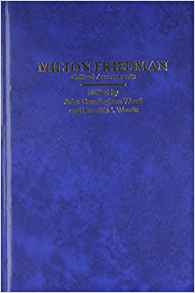

 |

|

The average rating for Milton Friedman based on 2 reviews is 3.5 stars.
Review # 1 was written on 2011-04-20 00:00:00 Melissa Cornell Melissa CornellThe best way to sum up Stigler's memoir is a quote from the book: a scholar is an evangelist seeking to convert his learned brethren to the new enlightenment he is preaching. The beginning is spent chronicling Stigler's life, my general conclusion after reading the beginning was: 1. If I decide to seek my master's in economics, I will most definitely apply to Chicago, and be sorely disappointed if it doesn't live up to all of his lavish praise. 2. More name dropping than even "Howl," which did a lot of name-dropping. 3. In regards to the voracious name-dropping, more explanation would have been helpful! The only ones I can remember and attribute things to are Frank Knight and Milton Friedman, who was his BFF. 4. Lots of book titles too. Can't say I recall any offhand, but I'm sure they were thrillingly important! 5. He tries to be modest and say things like: my role in our work was so modest that my claim must be that I did not aid the enemy. But later on he has a page where he lists positions he's held in the government. Plus he has won a Noble Prize. Granted the giant list of positions is later but, it wasn't as though the arrogance wasn't apparent in his cutting remarks about Leon Henderson. Henderson had garnered some acclaim for predicting the Great Depression. Stigler continues to say that an "indulgent public had forgiven or forgotten his identical but mistaken predictions in previous years," thereby terming the "repetition of a prediction until it comes to pass the 'Henderson method.'" Once he delves into actual economic theory, however, he is much more interesting. Near the end of the memoir Stigler covers some examples of economics applied to things other than just markets. One example is Gary Becker who wrote a doctoral thesis entitled The Economics of Discrimination. He "employed the theory of international trade in studying discrimination" and reached two conclusions: 1. a small minority loses heavily by discrimination but a large majority loses a little 2. yet when a minority discriminates against the majority, discrimination against the minority increases. He also goes on to analyze childbirth and marriage in economic terms and it is absolutely fascinating. It's interesting that Stigler never really concretely espouses his own philosophies, you can only infer what they are based on what he writes about the thoughts of others. He talks about how the regulation of utilities companies does not affect how much they charge their customers and how the Clean Air Act is an example of a small self-serving lobby passing legislation to benefit itself. The self-serving lobby being the Appalachian miners. The legislation prevents the building of factories that would reduce air quality in an area, regardless of what its current air quality is. Therefore, the building of new factories is very difficult. Which is good, until Stigler points out that most factories are in the North or Northeastern United States and burn Appalachian coal, which is high-sulfur. If these factories were to relocate to the South or West they could burn the local low-sulfur coal. But instead, scrubbers must be installed in the chimneys of preexisting factories, which will continue to burn the more destructive fuel, keeping the miners in business. In conclusion, I have much higher hopes for my other Nobel (auto)biography about Marie Curie but do appreciate Stigler's introduction to applied economics and the various applications thereof. And also for his glowing recommendation of the University of Chicago. He was also able to succinctly summarize quite a few important theories, which I appreciated, and made me rethink my ideas on the role government should play in economics. Because, like he quotes Friedrich Hayek as saying, voting on the different parts of an economic policy so that each portion is the majority consensus is about as effective as doing the same for a military strategy. |
Review # 2 was written on 2011-02-19 00:00:00 Jason Mangawan Jason MangawanMemoirs of an Unregulated Economist (1988) by George Stigler is Stigler's intellectual autobiography. Stigler was a University of Chicago economist and a friend of Milton Friedman. According to people who knew him he was also pretty funny. The book is sometimes quite amusing, Stigler is very fond of making wry observations of how the world works. It's interesting to get an insiders view of what the University of Chicago Economics department was like. Stigler makes some interesting observations such as how experts are selected to testify to courts and to politicians. While not being paid they are selected in order to give whatever testimony somebody wants. Stigler is very sharp about how economics proceeds and how rarely people change their views quickly in response to one argument. He says that Coase and his theories of externalities was one such event that he's seen but explains how mostly life isn't like that. Memoirs of an Unregulated Economist isn't bad, for anyone interested in the Chicago School it's worth a look. |
CAN'T FIND WHAT YOU'RE LOOKING FOR? CLICK HERE!!!